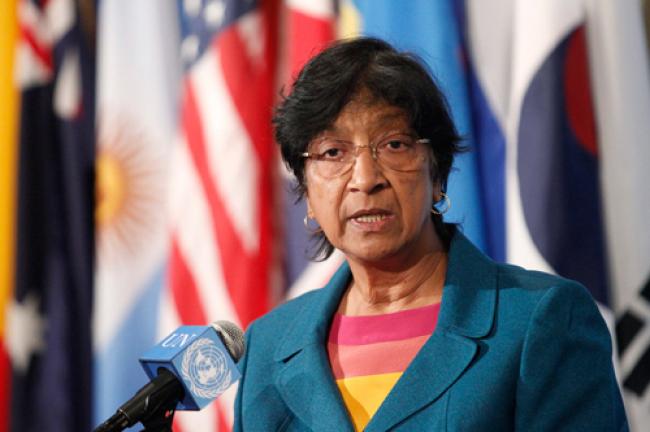29 Jul 2014

“I would like to stress to all those involved in the conflict, including foreign fighters, that every effort will be made to ensure that anyone committing serious violations of international law, including war crimes, will be brought to justice, no matter who they are,” Navi Pillay said. “I urge all sides to bring to an end the rule of the gun and restore respect for the rule of law and human rights.”
The High Commissioner made the comments while issuing a new report by the UN Human Rights Monitoring Mission deployed to Ukraine in mid-March, calling for greater care to prevent more civilian casualties.
The report, which covers the period from 8 June to 15 July, does not officially cover the 17 July downing of the plane. However, Pillay used the launch of the report to call for a “prompt, thorough, effective, independent and impartial investigation.”
The UN Security Council has also called for an international investigation into the incident, and demanded that armed groups allow unfettered access to the crash site and ensure that its integrity is maintained.
Meanwhile, in the report, the Office of the High Commissioner (OHCHR) documents how armed groups continue to abduct, detain, torture and execute people kept as hostages in order to intimidate and “to exercise their power over the population in raw and brutal ways.”
“Already increasing numbers of people are being killed with serious damage to civilian infrastructure, which – depending on circumstances – could amount to violations of international humanitarian law,” she said. “The fighting must stop.”
More than 812 people have been abducted or detained, according to the report, including politicians and employees of the local coal mining industry, but the majority of them ordinary citizens, such as teachers and students. Those detained are frequently used to seek ransom, while some are forced to dig trenches or fight on the front lines. There are also reports of alleged executions following so-called military tribunals.
In response, the Government of Ukraine has accelerated its security operations, resulting in heavy fighting and an estimated 101,617 people fleeing to other parts of Ukraine, according to the UN Refugee Agency (UNHCR).
“The reports of increasingly intense fighting in the Donetsk and Luhansk regions are extremely alarming,” Ms. Pillay said, with both sides employing heavy weaponry in built-up areas, including artillery, tanks, rockets and missiles.
The report also points out how impunity in the areas under the control of the armed groups in the east has led to the collapse of the rule of law.
OHCHR noted that while the Government faces challenges to restore law, order and security, it must urgently prioritize good governance, rule of law and human rights issues, especially as Ukraine “seeks to fulfil its EU aspirations and establish a democratic and pluralistic society.”
In addition, the Office underscored that the human rights situation in Crimea remains a great concern with intensified harassment and discrimination of Ukrainian nationals, Crimean Tatars, religious minorities and activities opposed to the 16 March referendum.
The report also noted the impact of the current economic recession facing the country, particularly in the east which is the country’s centre for heavy industry.
The intensified fighting and continuation of the conflict have led to “more polarized” opinions, including dramatic escalation of hate speech, particularly on social media, as well as demonstrations and protests, including in the Parliament.
High Commissioner for Human Rights Navi Pillay. UN Photo/Paulo Filgueiras